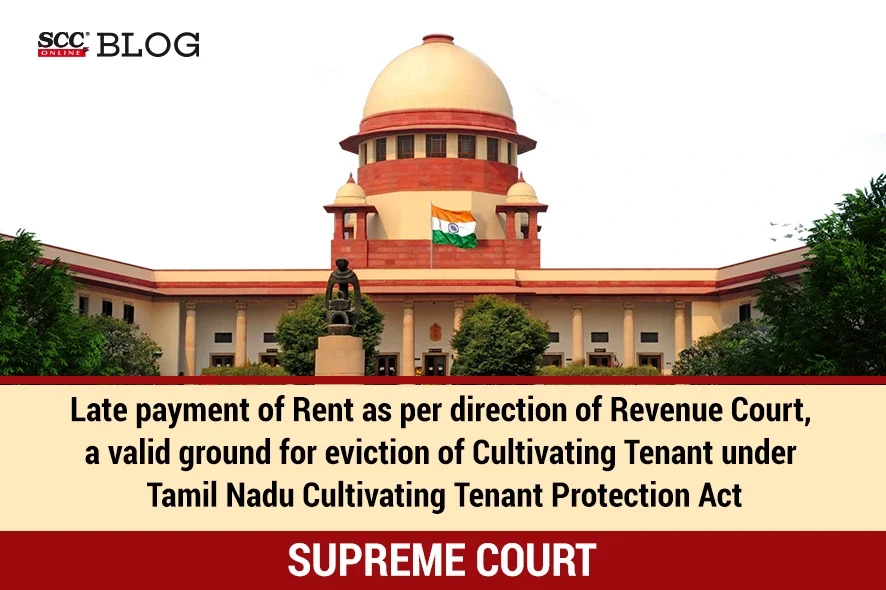Supreme Court: In a civil appeal against the Judgment and Order of the Madras High Court, wherein the High Court dismissed the revision petition filed by the appellant, the Division Bench of Krishna Murari and Ahsanuddin Amanullah*, JJ., the Court dismissed the appellant’s appeal and said that as per Section 3 of the Tamil Nadu Cultivating Tenant Protection Act, 1955, late payment of the rent as per the direction of the Revenue Court was clearly a valid ground for effecting the eviction. The Court also said that Section 4 of the Act provides for restoration of possession only in limited cases and that too when the default is of only one year of lease amount to be paid, whereas in the present case, the default was for three years.
Factual Matrix
The respondent had filed an application under Tamil Nadu Cultivating Tenant Protection Act, 1955 (‘T.C.T.P’/ ‘the Act’) in 2014 before the Revenue Court, Madurai (‘Revenue Court’) seeking eviction of the appellants for not having paid the lease rent for the Faslis at the rate of 10½ bags of paddy for each year, each bag weighing 65 kgs. The Special Deputy Collector, Revenue Court, on 04-02-2019 ordered the appellants to pay the lease rent of 31½ bags of paddy or its equivalent amount to the respondents, within the period of two months from the date of receipt of the Order. The lease amount was finally deposited by the appellants on 18-02-2021.
Thereafter, the appellants filed another T.C.T.P before the Revenue Court, seeking eviction of the appellants on failure to deliver the 31½ bags of paddy, or the amount equivalent, towards lease rent, which was allowed vide Order dated 03-12-2021, on the ground that the appellants did not deposit the lease rent amount within the period of two months. Aggrieved by the Order dated 03-12-2021, the appellants preferred a civil revision petition before the High Court. The High Court confirmed the Order of the Revenue Court dated 03-12-2021, thus the present appeal was filed by the appellants.
Court’s Decision
The Court noted that even after receiving the Order dated 04-02-2019 on 10-10-2020, compliance was not made within the period of two months i.e., by the date of 09-12-2020. The Court said that merely sending of a Legal Notice on 06-11-2020 to the respondent by the appellants to come and collect the rent would not, ipso facto, discharge the appellants of their onus, in law, to pay the rent. The Court also said that the appellants could not have called upon the respondents via a Legal Notice to come and collect the rent as they were obliged in law to pay and, if for any reason the respondent either due to non-availability or resistance/refusal to receive/accept the same, the Order dated 04-02-2019 had clearly provided that either 31½ bags of paddy or the amount equivalent thereto could easily have been deposited before the Revenue Court, which was ultimately stated to have been done by the appellants, though belatedly, on 18-02-2021.
The Court perused Section 3 and 4 of the Act and said that as per Section 3 of the Act, late payment of the rent as per the direction of the Revenue Court was clearly a valid ground for effecting the eviction. The Court also said that Section 4 of the Act provides for restoration of possession only in limited cases and that too when the default is of only one year of lease amount to be paid, whereas in the present case, the default was for three years.
Further, the Court said that the question of extension of time for compliance of the Orders of the Court does not, in any manner, relate to limitation. When the appellants had themselves admitted that they had given a Legal Notice on 06-11-2020 showing their readiness and willingness to pay the lease rent amount, then they cannot take plea that they were handicapped due to the COVID-19 pandemic. The Court noted that they deposited Rs.28,563/- on 18-02-2021, therefore, the Court said that it is clear that in the instant case, there was no such special handicap, effectuated by the pandemic, on the appellants in complying with the direction to pay 31½ bags of paddy or an amount equal thereto.
The Court noted that vide Order dated 04-02-2019, the Revenue Court had categorically held that the appellants were the ‘cultivating tenants’ and the respondents were the ‘landlords’. The Court said that the Act confers a privilege on the cultivating tenant vis-a-vis the landlord, by which the cultivating tenant is protected from eviction by the landlord. To grant such privilege, the scope of eviction of the cultivating tenant at the behest of the landlord is circumscribed, by the Act. Hence, the Court said that it is required to ensure that even the said limited grounds for eviction by the landlord of the cultivating tenant, are not frustrated by granting some extra benefit or indulgence to the cultivating tenant.
The Court said that in the present case, the default was of at least three years and the time given of two months was adequate. The Court also noted that whatever payment was made/ deposited by the appellant was made after over four months had elapsed, from the date of knowledge of the Order dated 04-02-2019, as also admitted by the appellants.
Therefore, the Court concluded that there was no infirmity in the Impugned Judgment and the Orders dated 04-02-2019 and 03-12-2021 passed by the Revenue Court. Thus, the appellant’s appeal was dismissed by the Court.
[K. Chinnammal v. L.R. Eknath, 2023 SCC OnLine SC 611, Decided on 11-05-2023]
*Judgment Authored by: Justice Ahsanuddin Amanullah
Know Thy Judge | Supreme Court of India: Justice Ahsanuddin Amanullah






